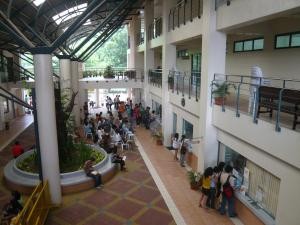The Office of the Vice Chancellor for Academic Affairs (OVCAA) has been revitalized with the UP Board of Regents’ approval of the unit’s proposed restructuring at its 1316th Meeting on Mar. 31.
The restructuring involves institutionalizing three offices, namely the General Education Center (GEC), Office of Field Activities (OFA) and the Office of International Linkages (OIL) and “expanding the services of, restructuring and/or renaming the five current offices,” the proposal noted.
Prior to its restructuring, five offices comprised the OVCAA, namely the Office of the Director for Instruction (ODI) created in 1992, the Office of the University Registrar (OUR), the University Library (UL), the Diliman Interactive Learning Center (DILC, 2003) and the Office of Extension Coordination (OEC).
The OVCAA and its offices are tasked with the development and implementation of globally competitive programs, systems and mechanisms for instruction, curriculum, and education technology that ensure the attainment of UP Diliman’s goals and objectives.
New offices. The creation of the GEC stems from the importance of GE reform and the long-expressed need for a GE center. “It will support the administration to monitor and evaluate GE programs, but teaching is not its function,” said Dr. Benito M. Pacheco, Vice Chancellor for Academic Affairs, in an interview in March.
On the other hand, OIL Diliman is envisioned as “a key force in UPD’s quest for academic excellence and social innovation through the promotion of academic and cultural exchanges. It shall provide an environment that allows the UPD community to actively and competently engage in global level pursuits,” notes the OVCAA Offices Sept. 2015 Midterm Report.
From one section at OVCAA, OIL Diliman will become a full-fledged office concerned with everything international, Pacheco said.
Meanwhile, the OFA will “oversee all local academic out-of-classroom activities that are part of the students’ curriculum, both in the undergraduate and graduate levels,” the Report states. It shall continuously provide expert advising, assistance and networking opportunities to academic units that will guarantee the quality of learning and exposure of students in the field (as required in their curriculum) while ensuring compliance of these activities with the University’s operational policies and guidelines.
However, “if the immersion or the on-the-job training is abroad, it will fall under OIL Diliman,” Pacheco said.
Restructured/redefined offices. Two bigger offices, the OUR and UL, will not change drastically but are being reorganized for better efficiency, Pacheco said.
Functions of the ODI and DILC have also been redefined.
From the conduct of teaching effectiveness seminars and monitoring of the SET (now the Student Evaluation of Teaching), the ODI, which is now the Office for the Advancement of Teaching (OAT), “will be involved in career tracking of the faculty, similar to functions of the Human Resource Development Office (HRDO). Unlike the HRDO that is concerned with the formalities of processing, hiring and promotions, OID will focus on the continuing education and training of faculty members, especially the younger ones. It is a major function or redefinition for ODI,” Pacheco said.
Rather than functioning as “a boutique developing good applications,” DILC should become the main platform,” Pacheco said.
According to its website, the DILC “supports the interactive learning process through the development and production of multimedia materials. It helps develop faculty expertise in the integration of new technologies in teaching and learning.”
In addition, the National Service Training Program (NSTP) will also be realigned. “Rather than looking at it as an extra-curricular activity, which was why it was with the Office of the Vice Chancellor for Student Affairs, under the OVCAA, it is now viewed as a curricular activity,” Pacheco said.
On the other hand, the OEC will continue to attend to local concerns, but will be transferred to the Office of the Vice Chancellor for Research and Development “in order to expand its activities relating to institutional extension projects and programs parallel with institutional research and creative works,” the proposal noted.
According to the proposal, OVCAA’s new structure was the result of the review and evaluation process that began in 2014 participated by the Chancellor, the VCAA, heads and key staff members of the unit. Planning workshops were likewise held and tentative changes were gradually introduced and tested in coordination with the Office of the Chancellor, OVCRD and OVCSA. Prior to the BOR’s approval, the structure was pre-tested for close to two years with Program Development Associates and contractual staff with favorable outcomes.
The OVCAA oversees three major concerns: Teaching, Curriculum and Education Technology.
The proposal defines Teaching as referring to both the practitioner and the practice of teaching. It covers all initiatives that pertain to the concerns of the academic staff in their roles as facilitators of learning and teaching and as members of their home unit and of the larger UP community. Curriculum refers to the philosophy, principles, content, structure and implementation of the degree programs and their shared courses while Education Technology refers to the resources, services and tools that facilitate and enhance learning and teaching within and outside the classroom, including their development, application and promotion.

